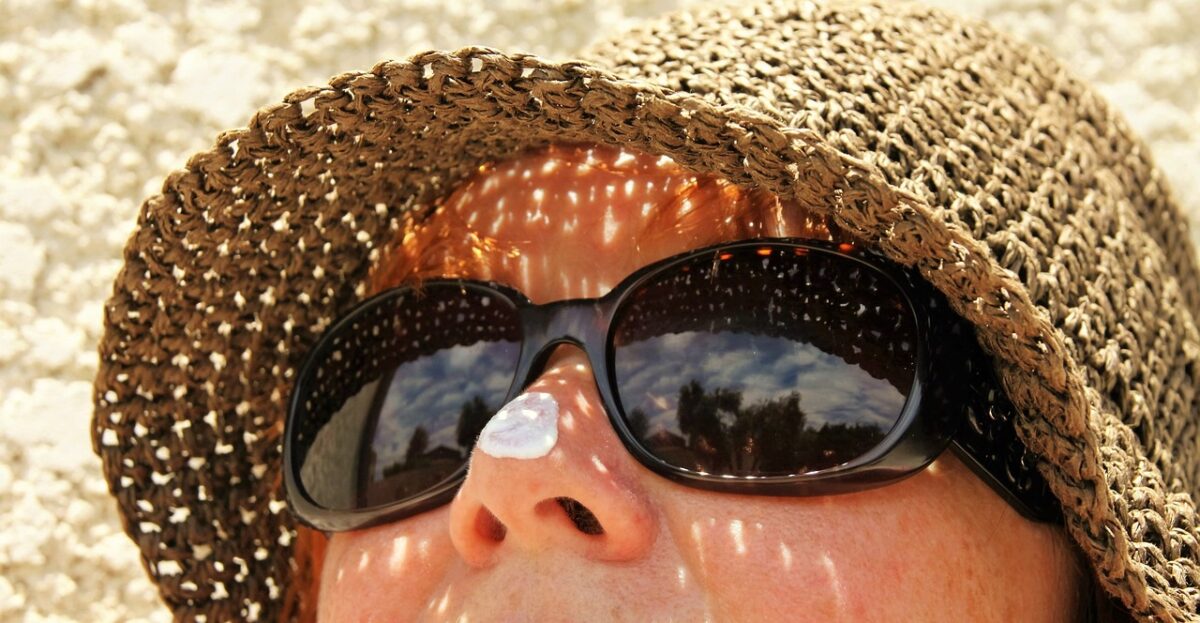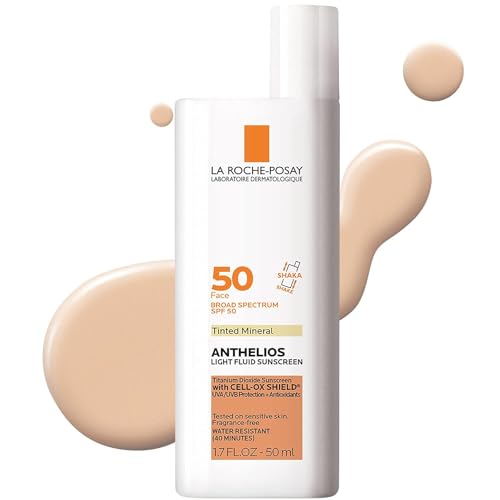What is Acne and How Does it Develop?
Acne is a common skin condition that occurs when hair follicles become clogged with oil and dead skin cells. It’s characterized by blackheads, whiteheads, pimples, and, in severe cases, hard, painful lumps beneath the skin’s surface. Acne primarily affects areas of the skin with a high number of oil glands, including the face, upper part of the chest, and back. Hormonal changes, stress, and certain medications can trigger or worsen acne.
The Role of Sun Exposure in Acne Development
Contrary to popular belief, sun exposure can actually exacerbate acne. While a bit of sun might temporarily dry out existing pimples and create a tanned complexion that masks redness, the long-term effects aren’t so sunny. The sun dries out your skin, causing it to produce more oil, which can clog pores and lead to more breakouts. Plus, sun exposure can lead to inflammation and hyperpigmentation, making acne scars more noticeable.
More from Glowing Gorgeous: Find out here the Best Silicone-Free Moisturizers And Why Do You Care
Common Misconceptions About Sun Exposure and Acne
One common misconception is that sunbathing or tanning can help clear up acne. In reality, while sun exposure may temporarily dry out pimples, it can lead to skin damage and even more breakouts in the long run. Another myth is that sunscreen causes acne. While some sunscreens can clog pores, many formulations are non-comedogenic and specifically designed for acne-prone skin.
The Dangers of Sun Exposure Beyond Acne
Beyond acne, sun exposure poses other serious risks to skin health. It’s the leading cause of premature skin aging, leading to wrinkles, age spots, and a leathery texture. More seriously, sun exposure is the primary cause of skin cancer, including melanoma, the deadliest form. Regular use of a broad-spectrum sunscreen is crucial for protecting your skin from these dangers.
The Importance of Sunscreen in Skincare
The Role of Sunscreen in Protecting Skin
Sunscreen plays a vital role in skin health by protecting it from the sun’s harmful ultraviolet (UV) rays. It works by either absorbing the UV rays or reflecting them off the skin. Regular use of sunscreen can prevent sunburn, reduce the risk of skin cancer, and prevent premature aging of the skin.
Benefits of Wearing Sunscreen Everyday
Wearing sunscreen everyday, even when it’s cloudy or you’re indoors, can provide numerous benefits. It can protect against harmful UV rays that can penetrate windows and cloud cover. Daily sunscreen use can also prevent the development of fine lines, wrinkles, and sunspots. Plus, it can help maintain an even skin tone, preventing hyperpigmentation and discoloration.
Sunscreen and Skin Clarity: Does Sunscreen Make Your Skin Clear?
While sunscreen doesn’t directly clear up acne, it can help maintain overall skin health, which is essential for clear skin. By protecting your skin from harmful UV rays, sunscreen helps prevent inflammation and hyperpigmentation, which can make acne scars more noticeable. Some sunscreens also contain ingredients like niacinamide, which can help reduce redness and inflammation associated with acne.
Sunscreen and Aging: Preventing Premature Aging and Loss of Collagen
Sun exposure is a leading cause of premature skin aging, often referred to as photoaging. It can lead to wrinkles, loss of elasticity, and uneven pigmentation. Sunscreen protects the skin from these damaging effects by blocking the sun’s harmful UV rays. This helps to maintain the skin’s elasticity and collagen levels, which are crucial for keeping the skin firm and wrinkle-free.
Sunscreen and Acne: A Complex Relationship
Does Sunscreen Help Acne or Make it Worse?
Sunscreen can be a double-edged sword when it comes to acne. On one hand, it protects your skin from harmful UV rays that can cause inflammation and make acne scars more noticeable. On the other hand, certain sunscreens can clog pores and trigger breakouts. The key is to choose a non-comedogenic sunscreen that won’t clog pores and is designed for acne-prone skin.
Can Sunscreen Cause Acne? Understanding Comedogenic Ingredients
Some sunscreens can cause acne, especially those that contain comedogenic (pore-clogging) ingredients. Look for sunscreens labeled as non-comedogenic, oil-free, and fragrance-free to minimize the risk of breakouts. Ingredients like zinc oxide and titanium dioxide are less likely to cause acne than chemical sunscreen ingredients.
How Does Sunscreen Help Acne Scars?
Sunscreen can help acne scars by preventing hyperpigmentation caused by sun exposure. When acne scars are exposed to the sun, they can darken and become more noticeable. Sunscreen protects these scars from the sun’s UV rays, preventing them from darkening and helping them to fade over time.
Does Sunscreen Prevent Acne?
While sunscreen doesn’t directly prevent acne, it plays a crucial role in overall skin health, which can indirectly affect acne. By protecting your skin from harmful UV rays, sunscreen helps to prevent inflammation and hyperpigmentation, which can exacerbate acne and make it more noticeable. Regular use of a suitable sunscreen is an important part of a comprehensive skincare routine for managing acne.
More from Glowing Gorgeous: Find out here Hyram’s Recommended Face Sunscreens For The Summer
Choosing the Right Sunscreen for Acne-Prone Skin
Mineral vs Chemical Sunscreen for Acne
When it comes to sunscreen, there are two main types: mineral and chemical. Mineral sunscreens, also known as physical sunscreens, use active mineral ingredients like zinc oxide or titanium dioxide. They work by sitting on top of the skin to deflect and scatter damaging UV rays away from the skin. They’re often recommended for sensitive and acne-prone skin because they’re less likely to clog pores and cause irritation.
On the other hand, chemical sunscreens absorb UV rays and convert them into heat, which is then released from the skin. They typically contain ingredients like oxybenzone, avobenzone, octisalate, octocrylene, homosalate, and octinoxate. While they’re usually easier to apply and less likely to leave a white cast, they can be more irritating for some people, especially those with sensitive or acne-prone skin.
Non-Comedogenic Sunscreen for Face: What to Look For
Non-comedogenic is a term you’ll want to familiarize yourself with if you have acne-prone skin. It means the product is specifically formulated to not block or clog your pores. Blocked pores can lead to breakouts, so it’s crucial to choose non-comedogenic skincare products, including sunscreen.
When shopping for a non-comedogenic sunscreen, look for one that’s also oil-free and fragrance-free to minimize potential irritation. It’s also beneficial to find a sunscreen with added skin-friendly ingredients. For example, niacinamide can help regulate oil production, and hyaluronic acid can provide hydration without feeling heavy or greasy.
Best Face Sunscreen for Acne Prone Skin: Recommendations from Reddit and Beyond
Based on numerous discussions and recommendations from skincare enthusiasts on Reddit and other platforms, EltaMD UV Clear Facial Sunscreen is a top pick for acne-prone skin. It’s a mineral-based, broad-spectrum sunscreen that’s non-comedogenic, oil-free, and contains niacinamide, a beneficial ingredient for acne-prone skin.
EltaMD UV Clear Facial Sunscreen
EltaMD UV Clear Facial Sunscreen is a dermatologist-recommended product that offers broad-spectrum protection against UVA and UVB rays. It’s a lightweight, silky formula that doesn’t leave any residue, making it perfect for acne-prone skin. This sunscreen is also packed with niacinamide, a powerful antioxidant that reduces inflammation and improves the skin’s texture and tone. It’s oil-free, sensitivity-free, and non-comedogenic, ensuring it won’t clog pores or cause breakouts.
Key (active) ingredients: Zinc Oxide, Octinoxate, Niacinamide.
Another highly recommended product is the La Roche-Posay Anthelios Clear Skin Dry Touch Sunscreen. It’s a chemical sunscreen that’s oil-free, non-comedogenic, and has a dry touch finish, meaning it won’t leave your skin feeling greasy or shiny.
Specific Brands: Does CeraVe Sunscreen Cause Acne? Does La Roche Posay Sunscreen Cause Acne?
While some people with acne-prone skin have reported breakouts after using CeraVe or La Roche-Posay sunscreens, it’s important to remember that everyone’s skin is different. What causes a breakout in one person might not cause a breakout in another. Both CeraVe and La Roche-Posay offer sunscreens that are non-comedogenic and designed to be suitable for sensitive and acne-prone skin. However, if you notice that a specific product is causing breakouts, it’s best to discontinue use and try a different product.
How to Incorporate Sunscreen into Your Acne Skincare Routine
The Ideal Skincare Routine for Acne-Prone Skin
An ideal skincare routine for acne-prone skin might look something like this:
- Start with a gentle, non-drying cleanser to remove dirt and excess oil.
- Follow with a toner to balance your skin’s pH levels.
- Apply a treatment product with acne-fighting ingredients like salicylic acid or benzoyl peroxide4. Use a lightweight, oil-free moisturizer to keep your skin hydrated.
- Finally, apply a broad-spectrum, non-comedogenic sunscreen to protect your skin from harmful UV rays.
Remember, consistency is key when it comes to skincare. Stick to your routine, and be patient. It can take several weeks to see improvements in your skin.
How to Apply Sunscreen Without Causing Breakouts
Applying sunscreen without causing breakouts starts with choosing the right product. Look for sunscreens labeled as non-comedogenic and oil-free. When applying, use a small amount (about a nickel-sized dollop) and gently rub it into your skin until it’s fully absorbed. Avoid rubbing or tugging at your skin, which can cause irritation. Also, remember to apply sunscreen to your neck and the back of your hands, areas that are often overlooked but are also exposed to the sun.
How to Get Rid of Acne from Sunscreen: Tips and Tricks
If you suspect your sunscreen is causing breakouts, don’t despair. First, make sure you’re using a non-comedogenic, oil-free product. If you’re still experiencing breakouts, try switching to a different brand or formula. Also, make sure you’re thoroughly cleansing your skin at the end of the day to remove all traces of sunscreen, as leftover product can clog pores and lead to breakouts. If you’re still struggling, it might be worth consulting with a dermatologist for personalized advice.
Is it Okay to Put Sunscreen on Pimples?
Yes, it’s perfectly okay to put sunscreen on pimples. In fact, it’s crucial. Sun exposure can darken acne scars and prolong the healing process, so it’s important to protect your skin. Just make sure to use a non-comedogenic, oil-free sunscreen to avoid clogging your pores and exacerbating your acne. If you’re using a spot treatment for your acne, apply that first, let it dry, and then apply your sunscreen.
Other Factors to Consider for Acne-Prone Skin
The Role of Moisturizer in Acne Treatment
Moisturizing is a crucial step in acne treatment. While it may seem counterintuitive to add more moisture to oily, acne-prone skin, keeping your skin hydrated can actually help regulate oil production and prevent your skin from producing excess oil. Look for a lightweight, oil-free moisturizer that won’t clog your pores. Some moisturizers also contain acne-fighting ingredients like salicylic acid or benzoyl peroxide, which can help treat acne while keeping your skin hydrated.
Does Tanning Help Acne or Make it Worse?
While some people believe that tanning can help clear up acne, the truth is that any perceived improvement is temporary and can actually make acne worse in the long run. Tanning can lead to dry skin, which can trigger your skin to produce more oil and potentially lead to more breakouts. Plus, tanning damages your skin and increases your risk of skin cancer. It’s much safer and more effective to treat acne with proven acne treatments and protect your skin with sunscreen.
The Impact of Sunburn on Acne
Sunburn can cause inflammation and irritation, which can make acne worse. Plus, as your sunburned skin starts to peel, the dead skin cells can clog your pores and lead to more breakouts. That’s why it’s so important to protect your skin from the sun with a broad-spectrum sunscreen, even if you’re already dealing with acne.
The Role of Zinc Oxide in Acne Treatment and Sunscreen
Zinc oxide is a common ingredient in both acne treatments and sunscreens. In acne treatments, it can help reduce inflammation and kill acne-causing bacteria. In sunscreens, it works as a physical blocker, deflecting and scattering UV rays away from the skin. Plus, it’s non-comedogenic and less likely to irritate sensitive or acne-prone skin, making it a great choice for both acne treatment and sun protection.
Frequently Asked Questions
Why Do I Break Out in the Sun?
Breaking out in the sun can be due to a few reasons. One is that sun exposure can cause your skin to dry out, triggering your skin to produce more oil, which can lead to breakouts. Another reason is that sweating can clog your pores, especially if you’re not washing your face regularly. Lastly, some sunscreens can clog pores and cause breakouts, so it’s important to choose a non-comedogenic sunscreen.
Can Not Wearing Sunscreen Cause Acne?
Not wearing sunscreen won’t directly cause acne, but it can make your acne worse. Sun exposure can cause inflammation and irritation, which can exacerbate acne. Plus, sun exposure can darken acne scars and prolong the healing process. So while not wearing sunscreen won’t cause acne, it’s still important to protect your skin from the sun if you’re dealing with acne.
Does Sunscreen Fade Acne Scars?
While sunscreen won’t directly fade acne scars, it can help prevent them from getting darker. Sun exposure can darken acne scars and prolong the healing process, so protecting your skin from the sun is an important part of treating acne scars.
Can the Sun Cause Acne?
The sun itself doesn’t cause acne, but sun exposure can make acne worse. The sun can cause your skin to dry out, which can trigger your skin to produce more oil and potentially lead to more breakouts. Plus, sunburn can cause inflammation and irritation, which can also exacerbate acne. So while the sun doesn’t directly cause acne, it can certainly make it worse.
Why Do I Have Acne at 50?
Acne at 50 can be due to a few reasons. Hormonal changes, such as those that occur during menopause, can trigger acne. Stress, poor diet, and certain medications can also contribute to adult acne. If you’re dealing with acne at 50, it’s a good idea to see a dermatologist, who can help you figure out the underlying cause and recommend a treatment plan.
Can You Use Expired Sunscreen?
While using expired sunscreen isn’t harmful, it’s not as effective. Sunscreen is designed to remain at original strength for three years. After that, it may not provide the same level of protection, which can leave your skin vulnerable to sun damage. So it’s best to replace your sunscreen once it’s expired.


 EltaMD UV Clear Face Sunscreen, SPF 46 Oil Free Sunscreen with Zinc Oxide,...
EltaMD UV Clear Face Sunscreen, SPF 46 Oil Free Sunscreen with Zinc Oxide,... La Roche-Posay Anthelios Clear Skin Dry Touch Sunscreen SPF 60, Oil Free Face...
La Roche-Posay Anthelios Clear Skin Dry Touch Sunscreen SPF 60, Oil Free Face...
 La Roche-Posay Anthelios Melt-In Milk Body & Face Sunscreen SPF 60, Oil Free...
La Roche-Posay Anthelios Melt-In Milk Body & Face Sunscreen SPF 60, Oil Free... La Roche-Posay Anthelios Tinted Sunscreen SPF 50, Ultra-Light Fluid Broad...
La Roche-Posay Anthelios Tinted Sunscreen SPF 50, Ultra-Light Fluid Broad... innisfree Daily UV Defense Sunscreen Broad Spectrum SPF 36 Face Lotion, 1.69 Fl...
innisfree Daily UV Defense Sunscreen Broad Spectrum SPF 36 Face Lotion, 1.69 Fl...
Comments